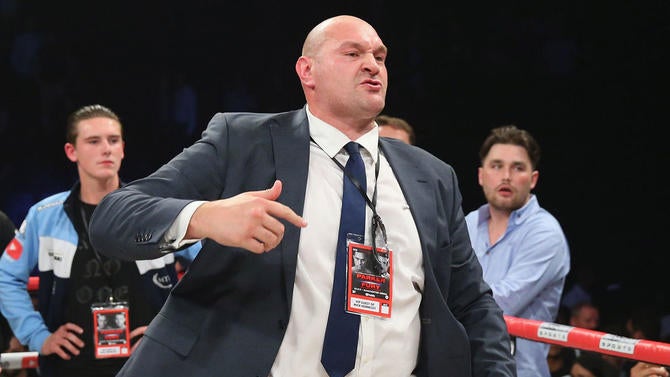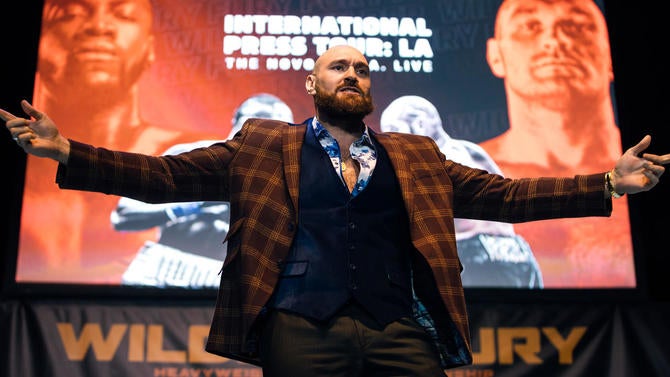If this were pro wrestling, it would be called a babyface turn.
After years of playing the villain as the trash-talking "Gypsy King," Tyson Fury has re-emerged onto the heavyweight championship scene as a new man armed with a new life's mission following a two-year downward spiral into suicidal depression and an equally dramatic comeback.
It's a reality that has been difficult for some fans to accept as genuine given Fury's brash history of offensive comments and behavior. Yet when the 6-foot-9 Englishman of Irish Traveller descent enters the ring on Saturday for the most dangerous test of his career against unbeaten WBC champion Deontay Wilder at the Staples Center in Los Angeles (Showtime PPV, 9 p.m. ET), he knows he'll be adding the titles of advocate and inspiration to his current one of reigning lineal heavyweight champion.
"I'll tell you what, I've already won because whether I win the fight or not on [Saturday], I have come back from every possible disadvantage," Fury told Showtime's Mauro Ranallo in a revealing sitdown during training camp. "And if I can help others along the way then I know I've done a good job. I'm not going to stop inspiring people forever because I know I've been through the worst pain anyone could ever feel mentally and physically."
Fury's incredible fall from grace has been well documented. He shocked the world three years ago this week by upsetting Wladimir Klitschko to end his nearly decade-long reign on the division and claim a trio of world titles.
Seemingly on top of the world, Fury (27-0, 19 KOs) spiraled almost instantly into a deep and dark depression. For the first time in his life, he began to regularly abuse drugs and alcohol. He ballooned to upwards of 400 pounds and embarked on a slow march toward death by way of excess as his only hope to dull the pain inside of him.

Eventually, the 30-year-old Fury was thrown out of his own house by his wife and four kids and willingly vacated his three world titles without a care in the world as the "silent killer" of mental illness continued to set him up for the knockout blow. His career was also on the ropes after a pair of positive tests for cocaine left the British Board of Boxing Control threatening a 12-year suspension.
"I was in a position of power; I had glory, fame, achievements, money, a family, all earthly assets that one could want but it meant nothing," Fury said. "I just spiraled out of control and I didn't care. I lost the passion to live. This went on for 18 months of me battling my own self everyday."
Referring to himself as "the man who cried wolf 1,000 times," Fury said he told those close to him on a regular basis he would one day return to the ring and regain the world titles he gave up without ever losing them. No one believed him, nor had he given them any reason to.
Fury's rock-bottom moment finally came on Halloween night of 2017. Dressed in a skeleton suit, he left his family at home to attend a party at a bar. But after one drink, clear and sensible thoughts finally engulfed his brain for the first time in two years.
What am I doing? You're telling me that you would rather be here with a load of kids half your age? Is this what you really want when you've got a family at home and you are depriving your wife and kids of a good time? Is this it? You have traded all of them achievements for what?
Thirteen months later, after shedding nearly 150 pounds and winning a pair of low-profile comeback fights, Fury willingly called out Wilder (40-0, 39 KOs) for a fight that allows the winner a chance to call himself the "baddest man on the planet" and best heavyweight.
"The odds of me overcoming those obstacles -- never mind the weight and mental health -- is like zero, it's not possible," Fury said. "'He ain't coming back because he can't.'
"I can't tell you in words how I felt and how down I was. When you lose control of your own mind, you are in a bad place."
Yet here Fury is. Should he defeat the 33-year-old Wilder and shock the world one more time it would be the kind of story that would not only make a good made-for-TV movie, it would largely be unprecedented.
The last 50 years have seen three heavyweight champions return from different versions of setbacks to reclaim at least a piece of their former glory.

Muhammad Ali rebounded from a three-plus year ban for draft evasion to eventually upset George Foreman and regain the title. Foreman did the same following a 10-year retirement to become a preacher yet, like Ali, needed multiple years of comeback fights (and even defeats) before he was able dramatically reclaim the throne. Mike Tyson also returned from a three-year prison sentence to win a pair of heavyweight titles.
None of those three, however, have a story exactly like what Fury is attempting to author. Only Ali entered a lengthy layoff still in possession of the same lineal title Fury claims and he initially lost it to Joe Frazier in their 1971 "Fight of the Century." Fury's story is unique because of the layers of self sabotage and how dark things got for him mentally and physically -- not to mention how quickly he's returning against the most dangerous opponent available.
But while Fury, in his own words, has already won simply by getting back to this point, his comeback in boxing terms won't have the same meaning unless he is able to back up his bold claims and become the first professional opponent to survive the distance against a healthy Wilder and regain the throne he willingly gave up amid chaos.
Despite England's Anthony Joshua (22-0, 21 KOs) holding three of the four recognized world titles in the division, his desire to put off a Wilder fight mixes with the presence of Fury's lineal championship to mean Saturday's winner wouldn't be out of bounds to call himself the best in the world.
If anyone has the right style and size to disarm and frustrate the athletic yet technically crude Wilder, it's certainly Fury. He also might be the only fighter daring enough to pull it off. Should he do so, along with the new identity he's carving out as a mental health advocate, Fury would elevate his name historically to the level of folk hero because of how often he has defied the odds inside the ring.
"The betting odds mean nothing to me because I've defied the odds, just even being alive today I defied the odds," Fury said. "Being a world champion defied the odds; being named Tyson Fury defied odds, too. So odds, I don't really think about odds, they don't mean anything to me at all. I'm not a gambling man at all.
"This is my purpose in life. I thought it was to be heavyweight champion of the world and do what I had to do but I now know my calling card is to spread the word on mental health and whatever it takes to do it, I am doing it."
Who wins Wilder-Fury? Visit SportsLine now to see boxing guru Peter Kahn's exclusive pick, from the boxing expert who cashed in 20-1 on the GGG-Canelo draw and just called Shawn Porter's upset of Danny Garcia.





















